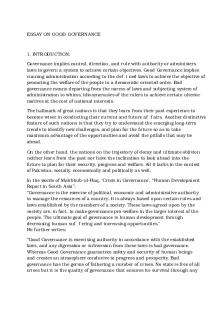Good Governance PDF

| Title | Good Governance |
|---|---|
| Author | Anonymous User |
| Course | Advanced Accounting |
| Institution | University of Michigan |
| Pages | 7 |
| File Size | 67.7 KB |
| File Type | |
| Total Downloads | 96 |
| Total Views | 195 |
Summary
It is helpful. ...
Description
Different Normative Ethical Theories Commonly Used in Business Decision-Making
Kohlberg’s Stages of Moral Development
An American psychologist, Lawrence Kohlberg constituted an adaptation of the psychological theory of Jean Piaget who also claimed that logic and morality develop through constructive stages. He agreed with Piaget’s theory in principle but he expanded the theory further. He was best known for his theory of stages of moral development which was based on stories such as Heinz dilemma. This theory focuses on the thinking process that one undergoes when he/she decides whether a behavior is right or wrong. He wants to discover how individuals would justify their actions once placed in similar moral dilemmas and how their moral reasoning changed as they grow older. His theory has six identifiable developmental stages which are grouped into three levels of morality. Each level has two sub-stages.
First, the pre-conventional level where most nine year olds and younger belong. Their guide in determining right and wrong is based on the standards of the adults and the consequences of following or breaking their rules. The first stage in the pre-conventional level is the obedience and punishment orientation where individuals do good to avoid the punishment and the second stage which is the instrumental purpose orientation where individuals focus on receiving rewards or satisfying personal needs.
Second, the conventional level where most adolescents and adults belong. The emphasis shift from self-interest to relationship with other people and social systems. Here, the moral reasoning is based on the norms of the group to which the person belongs. Under this level is the third stage which is the Good Boy/Nice Girl Orientation where their behavior is influenced by the approval of the society. The individuals want to gain/maintain the approval of others by being a good person. The fourth stage is the Law and Order Orientation where individuals are aware of the broader rules of the society wherein their judgements are influenced by the rules and they tend to abide these in order to uphold the law and to maintain social order.
Third, the post conventional level where individuals move beyond the perspective of their own society. Their judgement is based on the principles they chose and their reasoning is based on rights and justice. The fifth stage in this level is the Social Contract Orientation where individuals think that laws and rules help in improving human purposes. When laws are not consistent with individual rights and the interests of the majority, alternatives should be considered. The last/sixth stage is the Universal Ethical Principle Orientation which is the highest stage of functioning according to Kohlberg. He claimed that some individuals will never reach this level. This stage involves taking the perspective of every person or
group that could be affected by the decision. The appropriate action is based on one’s self chosen ethical principles of conscience.
After gaining knowledge about this theory, I learned that people base their judgement of right and wrong and the appropriate actions to be taken on what they think is right, socially acceptable and
the one which will bring them rewards. On the other hand, sometimes people decide based on what they think is applicable to the situation like the story of Heinz Dilemma wherein he stole a medicine from a chemist for his wife who has a cancer even though it is against the rules of the society. He based his action on what he thinks is right. In my case, I think I’m in the conventional level and sometimes in the post conventional level of this theory.
Machiavellian Principle
This principle is suggested by Niccolo Machiavelli, an Italian diplomat, politician, historian, philosopher, humanist and writer of the Renaissance period. The principle of “the ends justifying the means” is evident in this theory. Machiavellianism suggests that goals should be given more importance than the method that will be use to achieve them. This approach includes using deception, manipulation theft and even murder. This theory focused on achieving one’s goals without considering if the method is wrong. It attempts to make people believe that if the result of an action is good then it is also done in a right manner.
I strongly disagree with this kind of principle. An action whether the result is good doesn’t mean that the method used is also right and acceptable. We should always put in our minds that there are no secrets that we can hide forever especially if we have done something evil to deceive other people. It will always wrong to do evil to achieve our goals. Remember that the basis in determining whether an action is right or wrong is that we’re not harming other people and we’re not taking advantage of their goodness.
Utilitarianism
One of the most powerful and convincing approaches to normative ethics in philosophy is Utilitarianism. Generally, utilitarianism suggests that an action to be morally right should produce the greatest good for the greatest number. This theory is a form of consequentialism where it states that an action is right based on the consequences it produces. This theory is concerned with the interests of the people equally.
The word utilitarianism was popularized by John Stuart Mill who was a successor of Jeremy Bentham, the one who found the utilitarian philosophy Benthamism. Mill modified his philosophy. According to Bentham, actions are accepted as right if it promote happiness. Proponents of this theory argued on some points whether an action should be based on act utilitarianism which is based likely on
results or on rule utilitarianism which is based on whether agents should conform to rules that maximizes utility. They also argued if total utilitarianism or average utilitarianism should be used fully. This theory suggests that if the action will bring pleasure to people it is inherently good.
I don’t agree with this theory because I believe that the consequences of an action aren’t enough to prove if it is good. Good outcomes don’t guarantee that we do well because the process of achieving this result is always important and we shouldn’t content ourselves with producing good results. We should always mind that what we do is always done in a right manner.
In the story that I have read, the organs of a brain dead person will be donated to four people in the same hospital but it was found out later that the reason why the person became brain dead is due to someone’s willful act to kill him. The problem is that in order for the perpetrator to be punished, an autopsy should be done to know the cause of his death but if they will proceed with the autopsy, the organs of that person cannot be donated. If we apply this theory, we will choose not to proceed with the autopsy to donate the organs that will save the lives of four people. However, it is only right to proceed with the autopsy to punished the perpetrator and give justice to the family of the victim. Fortunately, the doctors found out a way wherein the autopsy and the donation of the organs can be done simultaneously. My point here is that the concept of the greatest good for the greatest number of people sometimes contradicts morality and it brings me to the conclusion that Utilitarianism is limited. In this kind of situation, we should also consider the justice that the family of the victim seeks.
The Principle of Rights and Virtues: The Kantian Ethics
Immanuel Kant, a German philosopher who is the proponent of this principle opposed the principle of utilitarianism. For him, some types of actions including murder, theft and lying were forbidden, even if it would bring more happiness. For Kantians, a person shouldn’t perform an action if it is bad even though it will bring goodness to other people. According to this theory, an action to be considered as right or wrong should be based whether one’s duty is fulfilled rather than on consequences. He believed that there was a supreme principle of morality and referred to it as The Categorical Imperative which determines our moral duties. He argues that a person is good or bad based on his motivation of his actions and not on the goodness of the consequences. For me, this principle is very virtuous. For someone to sacrifice his/her own happiness to do his moral duty is a very selfless act. He doesn’t care if he/she will not gain something. The goodness or badness of a person depends on his motive or reason for doing it even if it doesn’t bring good result. His motive is the basis on deciding whether he do good or bad. I agree with Kant that we should always do good but sometimes doing the right thing is not applicable on some situations especially if a person’s life is on the line. Like those people who steal money for their loved ones who are ill. Sometimes we tend to judge them that they are bad but their love for their family overpowers their sense of morality.
John Rawl’s Principle of Justice
John Rawl, the author of this theory seeked to solve the problem regarding the equal distribution of goods in society which is called distributive justice through the use of different familiar devices of the social contract specifically the Original Position wherein everyone decides principles of justice from behind a veil of ignorance. He derived his two principles of justice from the resultant theory known as “Justice as Fairness. The first principle ensures that each person has the right to basic liberty consistent with the liberty of the others which is mainly concerned with the basic liberties such as the political liberty to vote and run for office, freedom of speech and assembly liberty of conscience, freedom of personal property and freedom from arbitrary arrest. The second principle which states that social and economic positions are to be of everyone’s advantage and open to all under conditions of fair equality of opportunity.
There are also people who criticized this principle. One of them is the economist Amartya Sen. She argued that we should not attend only to the distribution of primary goods, but also on how people will use those goods effectively.
I somehow agree with John Rawl’s Principle of Justice. There should be an equal distribution of primary goods but like what Amartya Sen said it is not enough that everyone receives equal amount. We should know how to use it effectively because these goods are scarce. I also agree with Rawl’s first principle which states that everyone should have the basic liberty that others have and his second principle that suggests that social and economic positions should be open and advantageous to all. I strongly believe that this promotes equality among all.
Moral Positivism of Hobbes
Thomas Hobbes was an American philosopher who is recognized as one of the founders of political philosophy. His theory of moral positivism largely depends on the law of the state. According to him, an action is good if it consistent with that of the law and it is bad if it is against the law.
He claims that all the rights of humans are derived from the state, contracts, freedom of other people and from customs. He concluded that there is no natural law and therefore there is no natural right. In his study of this theory, it is said that men are in the middle of a war before the State is established. Thus, there was no law, morality and distinction between right or wrong. To end the war, men joined together to form the State. It was just then when the laws, duties and rights are established.
I disagree with this theory because what is happening right now is that the laws of the state are not consistent with what God commands. Abortion, same-sex marriage and divorce is socially accepted in some countries and now there are also Filipinos who want this things to be accepted in our country....
Similar Free PDFs

Good Governance
- 7 Pages

GOOD GOVERNANCE
- 40 Pages

UNDP on good governance
- 15 Pages

GOOD CORPORATE GOVERNANCE
- 14 Pages

Module 1 - Good Governance
- 10 Pages

Essay ON GOOD Governance
- 11 Pages

good governance exam
- 6 Pages

GOOD CORPORATE GOVERNANCE
- 25 Pages

prinsip good governance Jepara
- 8 Pages

Makalah Good Corporate Governance
- 12 Pages

Makalah Good Governance
- 11 Pages
Popular Institutions
- Tinajero National High School - Annex
- Politeknik Caltex Riau
- Yokohama City University
- SGT University
- University of Al-Qadisiyah
- Divine Word College of Vigan
- Techniek College Rotterdam
- Universidade de Santiago
- Universiti Teknologi MARA Cawangan Johor Kampus Pasir Gudang
- Poltekkes Kemenkes Yogyakarta
- Baguio City National High School
- Colegio san marcos
- preparatoria uno
- Centro de Bachillerato Tecnológico Industrial y de Servicios No. 107
- Dalian Maritime University
- Quang Trung Secondary School
- Colegio Tecnológico en Informática
- Corporación Regional de Educación Superior
- Grupo CEDVA
- Dar Al Uloom University
- Centro de Estudios Preuniversitarios de la Universidad Nacional de Ingeniería
- 上智大学
- Aakash International School, Nuna Majara
- San Felipe Neri Catholic School
- Kang Chiao International School - New Taipei City
- Misamis Occidental National High School
- Institución Educativa Escuela Normal Juan Ladrilleros
- Kolehiyo ng Pantukan
- Batanes State College
- Instituto Continental
- Sekolah Menengah Kejuruan Kesehatan Kaltara (Tarakan)
- Colegio de La Inmaculada Concepcion - Cebu




